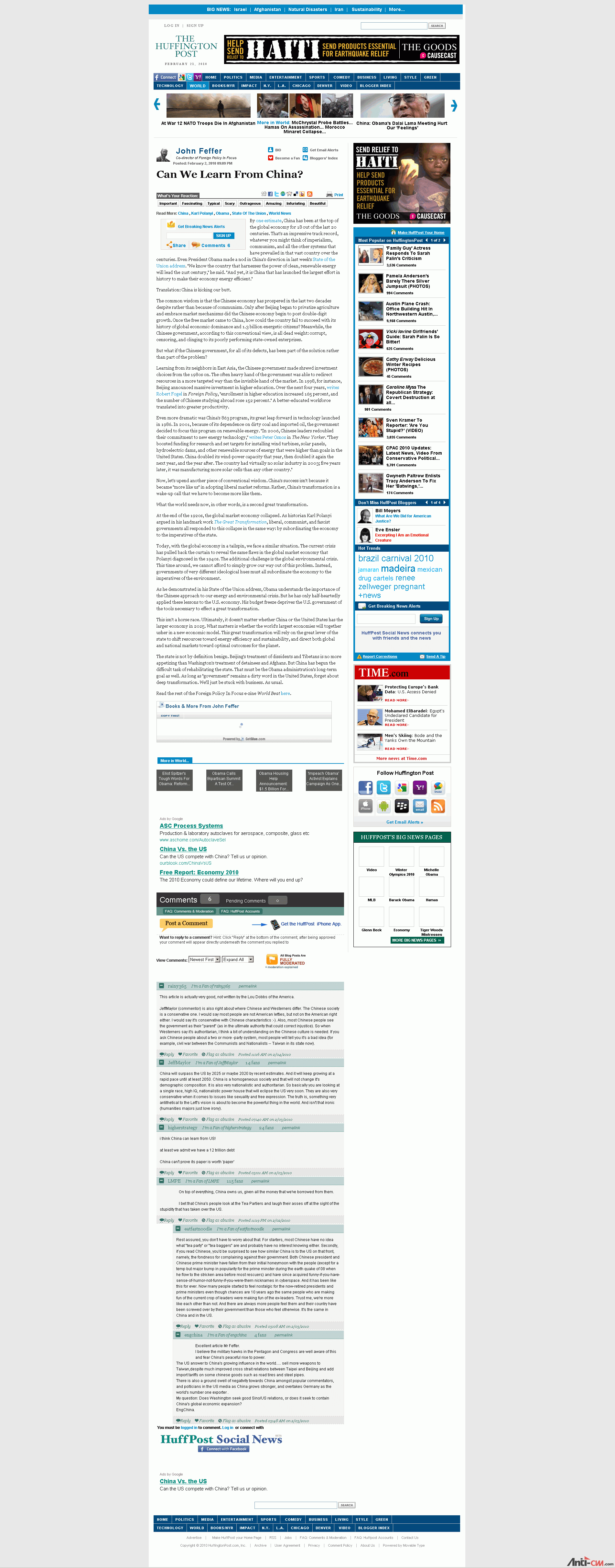|
|
http://www.huffingtonpost.com/john-feffer/can-we-learn-from-china_b_446936.html
John Feffer
Co-director of Foreign Policy In Focus
Posted: February 2, 2010 09:09 PM
Can We Learn From China?
By one estimate, China has been at the top of the global economy for 18 out of the last 20 centuries. That's an impressive track record, whatever you might think of imperialism, communism, and all the other systems that have prevailed in that vast country over the centuries. Even President Obama made a nod in China's direction in last week's State of the Union address. "We know the country that harnesses the power of clean, renewable energy will lead the 21st century," he said. "And yet, it is China that has launched the largest effort in history to make their economy energy efficient."
Translation: China is kicking our butt.
The common wisdom is that the Chinese economy has prospered in the last two decades despite rather than because of communism. Only after Beijing began to privatize agriculture and embrace market mechanisms did the Chinese economy begin to post double-digit growth. Once the free market came to China, how could the country fail to succeed with its history of global economic dominance and 1.3 billion energetic citizens? Meanwhile, the Chinese government, according to this conventional view, is all dead weight: corrupt, censoring, and clinging to its poorly performing state-owned enterprises.
But what if the Chinese government, for all of its defects, has been part of the solution rather than part of the problem?
Learning from its neighbors in East Asia, the Chinese government made shrewd investment choices from the 1980s on. The often heavy hand of the government was able to redirect resources in a more targeted way than the invisible hand of the market. In 1998, for instance, Beijing announced massive investment in higher education. Over the next four years, writes Robert Fogel in Foreign Policy, "enrollment in higher education increased 165 percent, and the number of Chinese studying abroad rose 152 percent." A better-educated workforce translated into greater productivity.
Even more dramatic was China's 863 program, its great leap forward in technology launched in 1986. In 2001, because of its dependence on dirty coal and imported oil, the government decided to focus this program on renewable energy. "In 2006, Chinese leaders redoubled their commitment to new energy technology," writes Peter Osnos in The New Yorker. "They boosted funding for research and set targets for installing wind turbines, solar panels, hydroelectric dams, and other renewable sources of energy that were higher than goals in the United States. China doubled its wind-power capacity that year, then doubled it again the next year, and the year after. The country had virtually no solar industry in 2003; five years later, it was manufacturing more solar cells than any other country."
Now, let's upend another piece of conventional wisdom. China's success isn't because it became "more like us" in adopting liberal market reforms. Rather, China's transformation is a wake-up call that we have to become more like them.
What the world needs now, in other words, is a second great transformation.
At the end of the 1920s, the global market economy collapsed. As historian Karl Polanyi argued in his landmark work The Great Transformation, liberal, communist, and fascist governments all responded to this collapse in the same way: by subordinating the economy to the imperatives of the state.
Today, with the global economy in a tailspin, we face a similar situation. The current crisis has pulled back the curtain to reveal the same flaws in the global market economy that Polanyi diagnosed in the 1940s. The additional challenge is the global environmental crisis. This time around, we cannot afford to simply grow our way out of this problem. Instead, governments of very different ideological hues must all subordinate the economy to the imperatives of the environment.
As he demonstrated in his State of the Union address, Obama understands the importance of the Chinese approach to our energy and environmental crisis. But he has only half-heartedly applied these lessons to the U.S. economy. His budget freeze deprives the U.S. government of the tools necessary to effect a great transformation.
This isn't a horse race. Ultimately, it doesn't matter whether China or the United States has the larger economy in 2025. What matters is whether the world's largest economies will together usher in a new economic model. This great transformation will rely on the great lever of the state to shift resources toward energy efficiency and sustainability, and direct both global and national markets toward optimal outcomes for the planet.
The state is not by definition benign. Beijing's treatment of dissidents and Tibetans is no more appetizing than Washington's treatment of detainees and Afghans. But China has begun the difficult task of rehabilitating the state. That must be the Obama administration's long-term goal as well. As long as "government" remains a dirty word in the United States, forget about deep transformation. We'll just be stuck with business. As usual.

|
Can, Feffer, From, John, learn, Can, Feffer, From, John, learn, Can, Feffer, From, John, learn
评分
-
1
查看全部评分
-
|